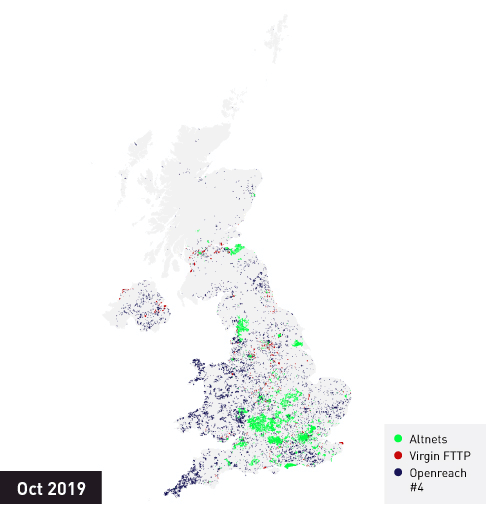The UK FTTP consolidation cycle
The telecoms fibre-to-the-premises (FTTP) market has grown significantly in recent years, driven in part by the shift towards remote working and the increasing demand for ultra-high-speed broadband from streaming video, online collaboration, cloud services and other online data-intensive activities. The combination of government support, regulatory changes, technological innovation and the ability to mobilise investment has created a favourable environment for the growth of alternative network providers (altnets) in the UK FTTP market, offering competitive alternatives to the established players such as BT and Virgin Media O2.
Fibre altnets have been effectively competing in the market by building their own networks, often focusing on specific geographical areas, offering fast and reliable services, and frequently being the first FTTP option available in these areas. This altnet deployment has led to increased competition in the broadband market, with consumers benefiting from improved availability, greater choice and lower prices. On a broader perspective, the rise of the altnets with their innovation in FTTP deployment has been beneficial and has accelerated the overall development of the UK’s digital economy and critical infrastructure.
Figure 1: FTTP deployment evolution, UK

The rapid growth of altnets, however, has led to concerns about their own sustainability. Many altnets are still early-stage companies and face significant challenges in securing funding, resourcing projects, deploying networks (particularly dealing with overbuild by larger, established, operators), developing brand awareness, and selling to (and connecting) end users. These challenges can limit their ability to acquire customers and compete with the larger, more established fixed broadband providers, ultimately hindering their chances of achieving profitability and ensuring long-term viability.
Preliminary indications of market consolidation have started to surface. Notably, just a few altnets have received funding. Since 2021, approximately 70% of capital raised by UK challenger FTTP operators has been allocated to just three companies: Cityfibre (accounting for approximately GBP6 billion, ~60% of total), Netomnia (~7%), and Gigaclear (~4%). Other large altnets such as Hyperoptic and Community Fibre have also secured capital prior to this period and are backed by financial institutions with considerable financial strength. The relative concentration of recent funding among these larger players suggests that the market is increasingly supporting a narrower subset of altnets believed to be long-term winners, enabling them to expand their deployments or acquire existing players. In response, many smaller altnets are now considering merger opportunities in order to benefit from greater combined scale.
Merger and acquisition (M&A) activity among FTTP players has intensified, with the number of transactions since 2021 matching the cumulative count of the previous decade, and in terms of value, surpassing it by approximately 3.5 times (GBP146 million). Most acquirers have been altnets themselves, including Community Fiber, Connexin, Glide and Voneus. Many investors now have multiple UK altnets in their portfolios and may target consolidation of these companies to drive revenue and cost synergies, as seen earlier this year through the consolidation of the four altnets owned by Fern Trading.
In the coming months, some altnets may face challenges in raising new capital. We are also aware that some debt processes are taking longer to reach closure than before. This could result in some altnets running low on cash and lead to proactive consolidation, or distressed asset sales. Trooli, is one such altnet that found it difficult to raise additional capital to support its roll-out and was reported to have been taken over by Vauban Infrastructure Partners in early 2023.
An interesting development has been Cityfibre’s recent agreements to wholesale on other altnets’ networks. This is also a form of market concentration at the wholesale layer which reduces the likelihood of overbuild and could ultimately lead to an amalgamation of the stakeholders.
Taking a broader view of the industry, FTTP has disrupted fixed broadband through innovative deployment strategies and product differentiation, leading to the emergence of numerous new players. The valuation dynamics have gradually shifted from network deployment (homes passed) to customer acquisition (homes connected), necessitating strong brands, effective marketing, perseverance, and perhaps, deeper pockets for sustained success.
A Harvard Business Review (HBR) article1 has set out a generic industry consolidation cycle as being in four phases:
- opening
- scale
- focus
- balance and alliance.
In the scaling phase, market participants are seeking economies of scale: weaker players leave the market or, more likely given the economics of network deployment, are acquired by stronger entities, which may in turn lead to increased adoption rates and other economies of scale. This phase also often fosters increased collaboration and partnerships among players as they seek to achieve operational efficiencies (again economies of scale). In our view, the UK FTTP market is currently well into the ‘scale’ phase of the consolidation lifecycle.
The substantial investment required to deploy FTTP networks (the barrier to entry for this industry) and the ability to convert capital expenditure into revenue (that is, customer take-up which leads to revenue first and then profitability) are key drivers that determine the speed at which the industry moves through the first two consolidation phases. Rumours of larger consolidations, the megadeals, may signify that M&A activities are accelerating, and/or that the market is moving towards the ‘focus’ phase. Recent speculation regarding a potential Virgin Media O2 takeover of CityFibre is one such example.
Business consolidation cycles are complex and influenced by multiple factors including economic and market conditions, technological advancements, the regulatory environment and capital availability. This confluence of drivers extends well beyond the control of individual companies. Given this, market participants need to identify and monitor the overall trajectory of the market, understand the critical success factors, explore possible scenarios, and focus on the strategic options available to them.
Analysys Mason’s strategy and transaction support practice can assist FTTP companies in successfully navigating the ongoing consolidation cycle. We offer in-depth analysis of market trends and consolidation drivers, helping companies to identify potential acquisition targets or merger partners. Our expertise extends to conducting comprehensive due diligence and valuations, as well as developing integration plans, post-merger strategies, cross-functional integration programme assurance and transformation support. With our team’s extensive experience in the telecoms industry, we deliver tailored solutions to meet the unique needs of our clients. For more information, contact Alex Pericleous.
1 https://hbr.org/2002/12/the-consolidation-curve
Article (PDF)
DownloadAuthor

Charles Murray
Partner, expert in transaction servicesRelated items
Tracker
Satellite consumer D2D news and deals tracker 2024–2025
Tracker
Consumer and enterprise broadband via satellite news and deals tracker 2024–2025
Report
Analysys Mason research and insights topics for 2026

